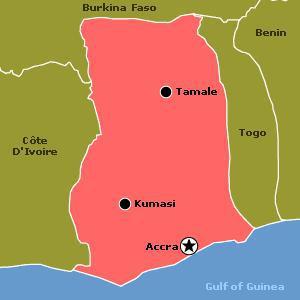By Prince Ofori-Atta

Ghana – UN picture
There is one year Ghanaians won’t mind blotting out of history. A severe dry spell and bush fires resulted in a grim famine in the country. But that was only the beginning of 1983.
The Nigerian Aliens Expulsion Order of late January sent home some 1.5 million migrants, mostly from West African neighbours Ghana, Niger and Benin. Countless numbers of people were sent back to Ghana on frighteningly overloaded ships amid harrowing tales of some returnees plunging to their deaths on high seas due to lack of space.
Shortly after Ghanaians witnessed depressing scenes of packed ships arriving at the Tema habour on the evening news with arrant shock, the novice PNDC [People's National Defence Committee] military government, led by a young and charismatic Flight Lieutenant Jerry John Rawlings, adopted a disastrous Economic Recovery Programme [ERP], introduced under the eagle eyes of the Bretton Wood institutions.
The result was a cocktail of misery. Besides the government’s warped anti-rich policies that sent Ghana’s middle classes scurrying for dear life, the population had to brace itself for food shortages, which the global media ignored in favour of the simultaneous Ethiopian famine that saw millions die.
Ghana had a lot more in common with Ethiopia than it was given credit for. Both countries were governed by unrelenting military dictatorships and suffering from widespread hunger. As food shortages worsened retailers started creating artificial shortages of goods by hoarding them so as to charge higher prices. Being branded “kalabule” or “hoarder” in the West African country was, more often than not, enough to send a trader to the gallows.
That was 30 years ago. As for the ERP, which continued until the mid-90s, with hindsight, the Bretton Wood institutions expressed regret at its failure years after many local economists had predicted that it was designed to plunge Ghana’s economy onto the rocks.
Some of the reforms, albeit necessary, were harsh. The privatisation of Ghana’s public sector saw a great deal of public sector workers being made redundant, with a private sector that was incapable of cushioning the shortfalls in the job sector. Sadly, the vestiges of those policies can still be witnessed in the country’s thriving informal sector.
Today, as Greece suffers the consequences of austerity policies, originally pushed for by the same institutions, the World Bank and IMF have now scaled back their support of those cataclysmic and economically senseless ideas. But while it took them less than two years, since June, 2011, to figure out that austerity measures only helps to stifle growth, Ghana’s ERP lasted for more than a decade.
The year 1983 started an avalanche of woes and thrust Ghana into the abysmal recesses of poverty. Ghanaians flocked to neighbouring Côte d’Ivoire, where the economy was experiencing a boom with a gleaming Manhattan-like economic capital city of Abidjan, under President Houphouët Boigny.
In Abidjan, the word failure had been changed for a swankier and more modern idiomatic expression: “tombé comme le Ghana” [fallen like Ghana]. Although it was a monumental historical truth, downsizing the history of a great sister nation to only four cruel words drove a quintillion jagged daggers into the pride of a country that was once a pacesetter.
But 1983 did not only teach Ghanaians a lesson in determination, it also taught them that the future is a right. Once seen as a beacon of hope for Africa, Ghanaians could not allow themselves to sink into the hopelessness of despair. In any case, one can’t dip any lower when at rock bottom, and the only place to go is up.
It has been a long, weary 30-year climb from the bedeviled 1983.
Read the original article on Theafricareport.com : Ghana’s tears, 30 years on [501822762] | The Africa Report.com
Follow The Africa Report: @theafricareport on Twitter
